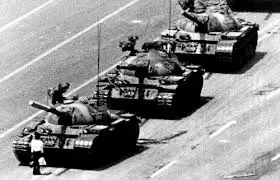Editorial: Remembering Tiananmen
 Working people in Hong Kong will gather on June 4 to keep alive the promise and the memory of China’s 1989 democracy movement and workers’ self-organized autonomous trade unions that challenged the official trade union structures of the Party-state. The Hong Kong Confederation of Trade Unions, the only independent trade union in China, has kept that memory alive through demonstrations and public events every year since the tanks rolled into Tiananmen Square and thousands were arrested and imprisoned across China three decades ago. Unions around the world should be equally vocal and visible in their support.
Working people in Hong Kong will gather on June 4 to keep alive the promise and the memory of China’s 1989 democracy movement and workers’ self-organized autonomous trade unions that challenged the official trade union structures of the Party-state. The Hong Kong Confederation of Trade Unions, the only independent trade union in China, has kept that memory alive through demonstrations and public events every year since the tanks rolled into Tiananmen Square and thousands were arrested and imprisoned across China three decades ago. Unions around the world should be equally vocal and visible in their support.
While much has changed in China, including the emergence of mass collective action by workers, the repressive apparatus which was overhauled, centralized and refined in 1989 remains in place. This apparatus includes the All-China Federation of Trade Unions (ACFTU), which has consistently colluded with the government and its security services to ensure that workers’ efforts to organize independently remain criminalized.
Earlier this year scores of worker activists and labour rights supporters across China ‘disappeared’ or were placed in criminal detention after workers at Jasic Technology attempted to form a trade union in 2018. The ACFTU was not merely passive – it played an active role in the Jasic crackdown. Yet for much of the trade union movement, repression in China has been reduced to an agenda item, if it figures at all, or trivialized to determine the proper etiquette should one encounter an ACFTU representative.
Is it the sheer scale of repression in China that numbs perception, principles and solidarity? A million or more Uighurs and other largely Muslim, largely Turkic-speaking peoples in Western China have been interned in ‘re-education through labour camps’. With the help of U.S. technology, the government has constructed a compulsory Uighur genetic database to facilitate mass surveillance. Artificial intelligence-based facial recognition technology targeting minorities is being deployed across China. The labour movement has traditionally taken a stand against mass incarceration, mass surveillance and forced labour. Yet today such systematic rights violations are met with silence. Can anyone believe that this vast machinery of repression and surveillance will not be directed against people struggling for worker rights and civil liberties? Can we condemn Amazon’s vile surveillance of its workers and remain silent in the face of surveillance on an incomparably larger scale?
Censorship in China ebbs and flows, with continuously shifting targets. Portions of the historical record – the Great Leap Forward, or the Cultural Revolution, for example – occasionally emerge for limited discussion before politics and power consign them again to the memory hole. The democracy movement and its brutal suppression remain taboo. As June 4 nears, there will be new arrests, detentions and efforts to expunge all references to the events of June 4, 1989 and their meaning from the internet, from private communications, and from memory.
The HKCTU is struggling against the steady suffocation of democratic space in Hong Kong, where leaders of the Occupy Movement have recently been sentenced on criminal convictions and HKCTU leaders themselves face charges. They nonetheless maintain consistent support for the struggle for worker rights on the mainland, and plan on being in the streets on June 4. The IUF stands proudly with them.